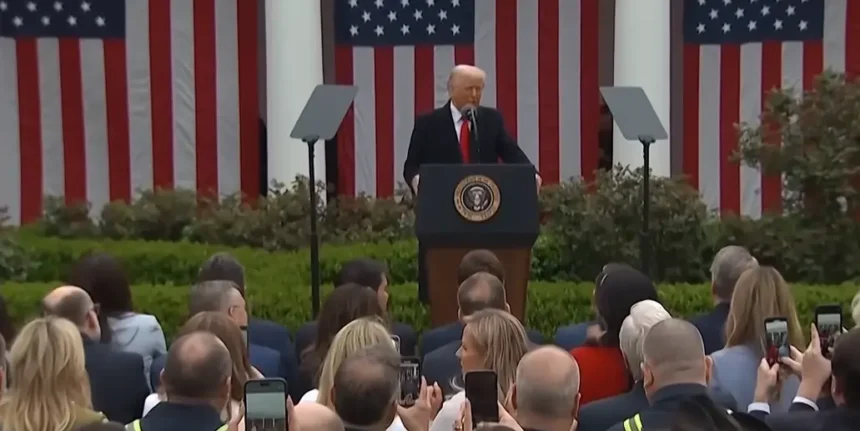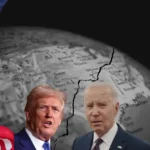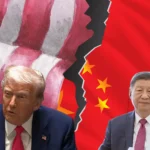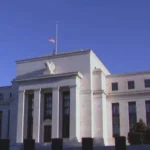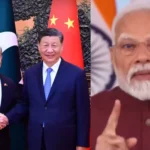April 12, 2025 – Washington, D.C.
The United States is grappling with a growing crisis of confidence on the world stage, as President Donald Trump’s aggressive and unpredictable tariff policies ignite fears of a global trade war. What the White House has dubbed “Liberation Day” for American economic sovereignty is being met with alarm by allies and adversaries alike, with many questioning the stability and reliability of the U.S. as a global leader.
On April 2, Trump announced sweeping tariffs, including a baseline 10% levy on all imports and higher rates targeting countries with significant trade surpluses, such as China (145%), Vietnam (46%), and Japan (24%). Citing a “national emergency” under the International Emergency Economic Powers Act, the president framed the tariffs as a bold move to restore fairness and bolster domestic manufacturing. However, the abrupt rollout and lack of clear strategy have triggered widespread condemnation and retaliatory measures, eroding trust in America’s economic stewardship.
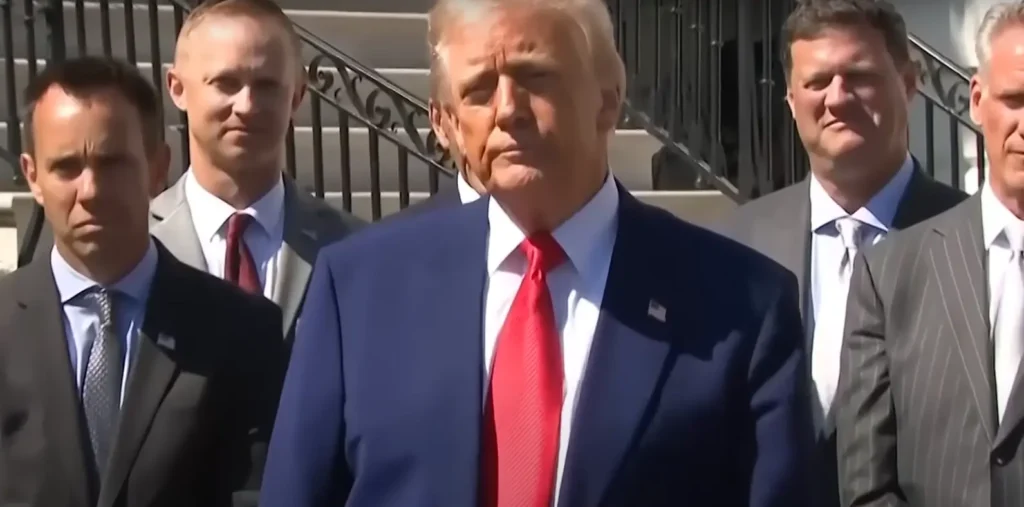
Global Markets in Turmoil
The tariffs sent shockwaves through global financial markets, with the Dow Jones Industrial Average plummeting nearly 4% and the Nasdaq suffering its worst day since March 2020. The S&P 500 lost nearly $6 trillion in value over four days, reflecting investor panic over disrupted supply chains and rising costs. Asian markets, particularly Japan’s Nikkei, saw sharp declines before a partial rebound when Trump paused some tariffs for 90 days, though analysts warn the reprieve is temporary.
“Trump’s tariffs are a sledgehammer to the global economy,” said Kristalina Georgieva, Managing Director of the International Monetary Fund. “The unpredictability is as damaging as the tariffs themselves. Nations are questioning whether they can rely on the U.S. as a partner.”
Allies Turn to Defiance
Traditional U.S. allies have expressed dismay, with some openly defying the White House. French President Emmanuel Macron called for a united European response, labeling the tariffs “a betrayal of shared values.” Italian Prime Minister Giorgia Meloni warned that a trade war “weakens the West,” urging negotiations to avoid further escalation. German Economy Minister Robert Habeck suggested Europe could outlast Trump’s pressure, predicting he would “buckle” if the EU holds firm.
Canada and Mexico, initially spared additional tariffs under existing USMCA agreements, have nonetheless faced economic fallout. Mexican officials, who ramped up anti-cartel operations to appease Trump, were stunned when he imposed tariffs anyway, prompting retaliatory levies on U.S. exports. Canadian Prime Minister Mark Carney condemned the move as “a blow to North American competitiveness.”
South Korea and Australia, long-standing security partners, also voiced frustration. Australian Prime Minister Anthony Albanese called the tariffs “not the act of a friend,” while South Korea announced emergency support for its export-driven industries.
China Leads the Counteroffensive
China, hit hardest by the 145% tariff rate, retaliated swiftly, hiking duties on U.S. imports to 125%. Beijing has mobilized a “national team” to shield its economy, funneling investments into domestic firms to offset trade losses. President Xi Jinping, in a rare public statement, urged the EU and others to oppose “unilateral bullying,” signaling a broader coalition against U.S. policy.
“The U.S. is isolating itself,” said Li Wei, a trade analyst at Peking University. “China is positioning itself as a defender of global trade, which could sway developing nations wary of American dominance.”
Domestic Doubts Grow
At home, Trump’s tariffs are dividing opinion. A Quinnipiac poll found 72% of Americans believe the tariffs will hurt the economy in the short term, with only 39% approving of Trump’s trade strategy. Economists warn of stagflation, with Yale’s Budget Lab estimating a $3,800 annual hit per household due to higher prices for goods like electronics, clothing, and food. The American Apparel and Footwear Association noted that 97% of clothing is imported, meaning consumers will bear the brunt of costs.
Despite the backlash, Trump remains defiant, insisting the tariffs are “doing really well” and predicting a “golden age” for the U.S. economy. Speaking to reporters on Air Force One, he called the tariffs “medicine” for decades of unfair trade, dismissing critics as “yippy.” White House Press Secretary Karoline Leavitt claimed over 75 countries are seeking trade deals, though no concrete agreements have emerged.
A Fractured Global Order
The tariff war has raised deeper concerns about America’s role in the world. For decades, the U.S. dollar and its open markets underpinned global stability. But posts on X reflect growing sentiment that Trump’s policies are accelerating the dollar’s decline, with some users warning of “global sanctions” against the U.S. as retaliatory tariffs mount. Economist Barry Eichengreen noted that, unlike past crises, investors did not flock to U.S. assets during the recent market turmoil, a sign of waning faith.
“America’s economic dominance relied on trust,” Eichengreen said. “Trump’s erratic approach risks squandering that. If the world stops seeing the U.S. as a safe bet, the consequences could outlast his presidency.”
As the 90-day tariff pause nears its end, the world watches warily. Allies are hedging their bets, exploring trade pacts that bypass the U.S., while adversaries like China seize the opportunity to rally support. For now, Trump’s gamble has united much of the globe—not in admiration, but in apprehension, as the U.S. faces an unprecedented test of its global standing.

